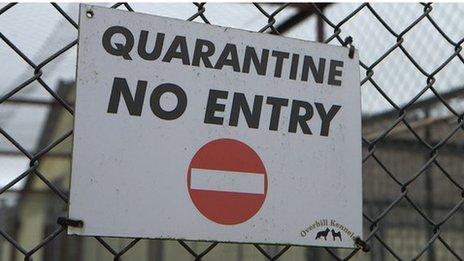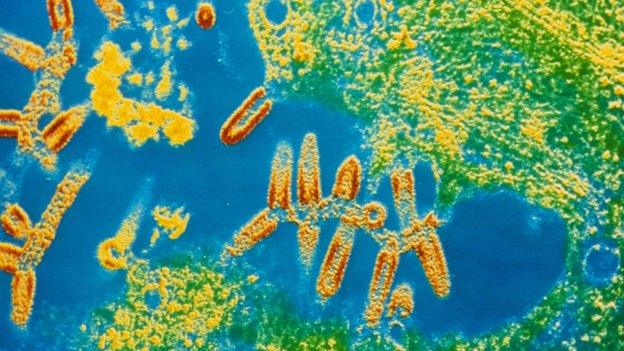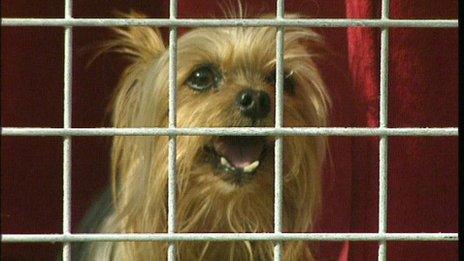Government urged to review UK rabies risk
- Published

More than 55,000 people around the world die every year from rabies
Scientists are warning that the rabies threat to the UK has increased following changes to dog quarantine rules.
Veterinary experts and animal welfare groups have told the BBC they are concerned that the rules no longer provide adequate protection against the threat of the disease.
"There is enough evidence from people on the front line that the risk has increased as a result of the changes," said veterinary surgeon Prof Sheila Crispin.
The Department for Environment, Food and Rural Affairs (Defra) says the risk of a dog with rabies coming into the UK is very low.
It estimated the new rules mean there would be one case of rabies in a pet in the UK once every 211 years, with the possibility of a person dying from rabies obtained from a pet once in every 21,000 years.
Before January 2012, the Pet Travel Scheme required animals to be microchipped, vaccinated against rabies and then blood tested. After a further six months they would be allowed entry to the UK.
But changes to the scheme, aimed at bringing the UK into line with the rest of Europe, mean animals from the EU and approved non-EU countries such as the US and Australia no longer need a blood test and now have to wait only 21 days following vaccination.
Vital check
Under the new rules, it means animals coming from France are treated the same as dogs coming from parts of Eastern Europe where rabies is endemic.
Prof Sheila Crispin, former president of the Royal College of Veterinary Surgeons, said the decision to do away with the need for a blood test had also removed a vital check in the system.
"For something as important as rabies you really want to know that the vaccine has worked. To wait 21 days and import the animal could be construed as a risk - add to that that the incubation period for rabies can go beyond 21 days and then potentially you have a problem," she says.
During 2011, according to Defra figures, 85,774 dogs entered the UK under the Pet Travel Scheme.
In 2012, that rose to 139,216 dogs - an increase of 62%.
A risk assessment was carried out by Defra before the changes to the Pet Travel Scheme were introduced last year.
Prof Crispin says the risk assessment was compiled on the basis that there would be 100% compliance with the new regulations - but that is not realistic, she says.
"The trouble is many people have regarded the relaxation as a wonderful opportunity to be dishonest and there's been a huge increase - something like 400% in the first year - of illegal imports, and they are the ones we know about," she says.
It is thought the increase is due to illegal smugglers being prepared to run the risk of getting caught, knowing that although they will be liable to pay kennel costs they will get the dogs back after three weeks in quarantine rather than six months.
They mostly smuggle puppies into the country because they are easier to sell than mature dogs.
Some of the dogs being smuggled into Britain are coming from Eastern Europe, where rabies is found.
Animal charities have told the BBC that the quarantine changes, along with the problem of illegal dogs, have left them concerned about the potential risk facing their employees.
Precautionary measure
"The quarantine regulations we have don't reflect the incubation period of rabies. It's not a case of scaremongering, but I think repeating the risk assessment would be a way of doing that, " said Paula Boyden, veterinary director at the Dogs Trust.
The Dogs Trust charity is now considering offering rabies vaccinations to front-line staff as a precautionary measure.
"At the moment we are monitoring the situation quite carefully. We're certainly considering it," said Paula Boyden.
The Dogs Trust is not alone. Battersea Dogs & Cats Home is also in talks over whether to begin offering rabies vaccinations to some of its workers.
"We're giving it serious consideration at the moment. It's a three-week wait after the animal has had the vaccination but the incubation period for rabies is anything from two to 12 weeks or even longer, " said Shaun Opperman, veterinary director at the home.
In a statement, Defra said: "The risk of a dog with rabies coming into the UK is very low and the risk of rabies being passed from a pet to a person is lower still.
"We continue to monitor the situation and will undertake a further, formal risk assessment if we feel that it is warranted."
According to Defra, the last case of rabies in dogs in the UK outside of quarantine was in a dog imported from Pakistan in 1970.
5 live investigates will be broadcast on Sunday, 20 October at 11:00 BST
- Published17 April 2015

- Published29 December 2011

- Published29 December 2011